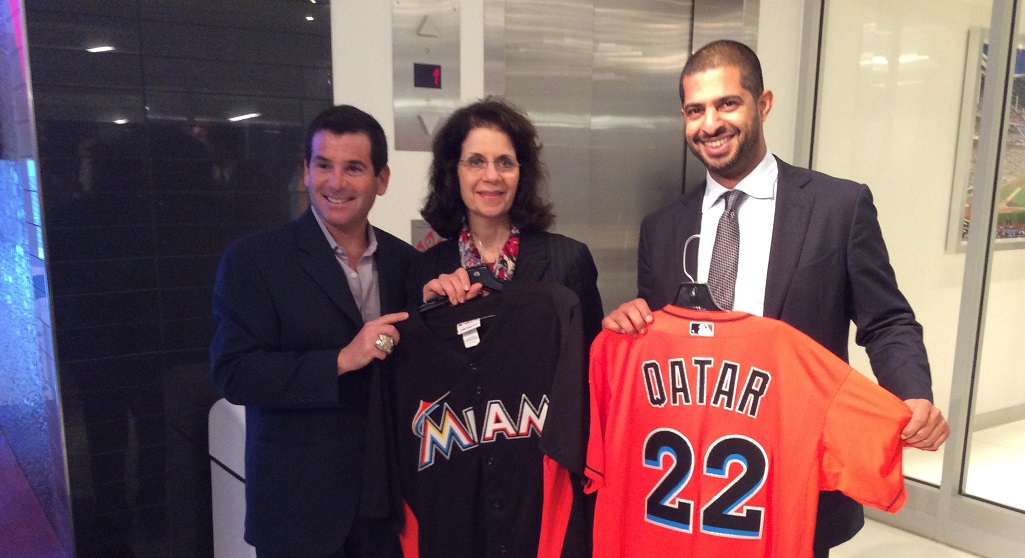
Wednesday, February 12th 2014 12:38 AM
DOHA: The Supreme Committee for Delivery & Legacy and the U.S. Embassy
in Qatar concluded a successful Reverse Trade Mission to Atlanta,
Georgia and Miami, Florida last week.
The delegation, led by Nasser Al Khater, Executive Director of
Communications and Marketing for the Supreme Committee for Delivery &
Legacy and H.E. Susan Ziadeh, U.S. Ambassador to the State of Qatar,
toured various sporting venues, visited leading institutions,
including major broadcasting and transportation centres, and laid the
foundation for creating lasting partnerships with innovative U.S.
companies as Qatar prepares to host the 2022 FIFA World Cup.
Qatari – U.S commercial ties have expanded substantially over the last
3 years, with exports growing by 80% from $2.5 billion in 2011 to $4.5
billion in 2013.
As part of the Reverse Trade Mission, Al Khater delivered
presentations to American companies in both Atlanta, the host city of
the 1996 Summer Olympic Games, and Miami, a new destination on the
global network of Qatar Airways in 2014, on the business opportunities
the 2022 FIFA World Cup Qatar offers.
Following the Committee’s first fact-finding business mission in the
United States on the West Coast in 2013, Al Khater said that the visit
to the East Coast this year provided further valuable insights into
the hosting of major sporting events.
"Our trade mission to both Atlanta and Miami was highly successful in
allowing us to observe international best practice, not only in the
hosting of major sporting events, but also thinking about how these
facilities are most efficiently utilised and incorporated in the
community for post-tournament legacy," said Al Khater.
"Today, as we enter the phase of delivery of our FIFA World Cup
projects on the ground, we also offer opportunities for the very best
partners in their respective fields to join us in this exciting
undertaking. Over the course of last week we were able to talk to
leaders in technology and innovation, for the latest in fan
experience, cooling systems, security, transportation and
accommodation, and many other areas. Our long list of American
partners who we have worked with in the past showcases just how much
we value innovation and expertise from this country," he added.
As part of the visit, the Executive Director and the U.S. Ambassador
to Qatar met with the Mayor of Miami-Dade County, Carlos Giménez, to
discuss infrastructure projects, green technologies, trade and
investment.
During the week-long visit to the United States, the Supreme Committee
for Delivery & Legacy also met with sports and business councils,
visited media leaders including CNN and Telemundo, researched
temporary accommodation solutions at the Port of Miami, and studied
the applications of sustainability and green building ratings to
public buildings and sports facilities.
"The mission introduced Qatari decision-makers to the best in U.S.
cutting edge technology, unparalleled services, and time-tested
know-how in hosting major sporting events to create partnerships
benefitting both countries," ambassador Ziadeh said.
The U.S. now accounts for 20% of Qatar’s imports worldwide, making it
the country’s number one import trading partner.
"Doha and Miami are both waterfront cities," Mayor Giménez noted. "We
have impressive skylines. We are global centres for trade and economic
development. And we serve as a bridge between different cultures and
different parts of the world."
With this in mind, he suggested: "There is no reason why we shouldn’t
explore further linkages between Qatar and Miami. Not only are we
honoured by [the arrival of Qatar Airways], but we’re glad because it
furthers the connection between two global destinations – and brings
your part of the world closer to ours."
Members of the Supreme Committee’s Technical, Legacy, Security and
Accommodation teams, as well as important stakeholders from ICT Qatar
and the Qatar Tourism Authority, visited innovative sporting venues to
assess the technical aspects of stadium construction, cooling systems,
event security and operations, the latest in fan experience and smart
phone technology, as well as the legacy use for non-competition
events.
"At the Georgia Tech Aquatic Centre in Atlanta, the delegation learned
about the impressive solar-powered venue built for the 1996 Summer
Olympic Games," said Al Khater.
"The legacy for the student community on campus was of particular
interest since one proposed Qatar World Cup stadium will be based in
Education City and giving key importance to renewable energy use and
precinct planning. The modular venue for the 1996 Olympic water polo
competition was also interesting given our plans for modular
components in stadiums, which will ensure no white elephants remain
after the tournament."
